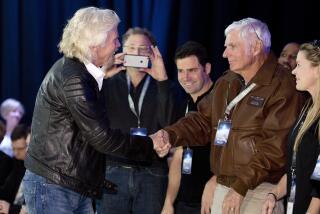‘Heroic’ Voyager, Its Human Guides
- Share via
It is impossible for me to express accurately the wonderment and awe that struck me upon first viewing your cover photo of Neptune (Aug. 23). I have scarcely seen anything so exquisitely beautiful in my life.
The image of “little” Voyager journeying millions and millions of miles away from earth, “braving” the multitude of hazards that space presents and sending back such glorious images is a decidedly heroic one to me. No human can yet do what Voyager, (with, granted its team of dedicated human assistants) has been able to do--perhaps the single most significant feat of our space program to date, short of landing a man on the moon.
I realize that the tendency to anthropomorphize machines is a dangerous one. Our microchip-based culture has come to depend more and more on technology--computers, robots, and so on--to improve the quality of life. And as electronic machines come to be more and more a part of our lives and work we begin to give them more and more human characteristics.
Who among us who uses computers hasn’t cursed or cajoled our machines when they don’t “cooperate,” or praised them when the result of our efforts finally glides error-free, sheet-by-sheet from the printer?
I wonder sometimes if this societal trend toward computerized workplaces and homes might not be dehumanizing us to an extent. And then I realize that heroic Voyager is a symbol of what’s best in us, it reflects and epitomizes the achievements of the human race. To an extent we are ourselves riding with Voyager on an endless trip . . . all too often finding things we never expected.
Like this beautiful portrait of Neptune.
FREDERICK ANDREW WARREN
Los Angeles
More to Read
Sign up for The Wild
We’ll help you find the best places to hike, bike and run, as well as the perfect silent spots for meditation and yoga.
You may occasionally receive promotional content from the Los Angeles Times.






